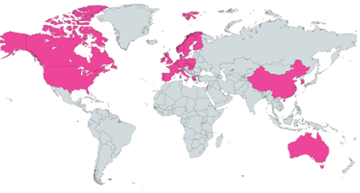Insights

The Power of Early Evidence in Market Access
Reimbursement as a key bottleneck in the biopharma value chain
Pharmaceutical manufacturers are striving to meet the constantly evolving needs of the healthcare landscape and improve patient outcomes by developing highly innovative therapies. However, the average cost of bringing a new pharmaceutical asset to market during the past decade was estimated at $1.3 billion (USD).1 Meanwhile, growing healthcare costs and constrained resources have forced health payers to become increasingly demanding for hard evidence demonstrating the clinical and economic value of new treatments.3-6
Unfortunately, the rising evidentiary requirements found the pharmaceutical industry unprepared and meant that a plethora of new drug approvals did not necessarily translate to commercial success. A study of the top 12 pharmaceutical companies found that projected return on R&D investment fell to only 1.9% in 2018 down from 10.1% in 2010.7 A separate study analysing drug launches in the United States between 2012 and 2017 found that 36% of drugs failed to meet their sales forecasts.8 Underperformance was most commonly attributed to market access issues such as lack of coverage and formulary restrictions. These insights exposed reimbursement as a potential key bottleneck in the biopharmaceutical value chain.
Evidence generation is crucial to successful reimbursement and encompasses a diverse set of research activities aiming to demonstrate the efficacy, safety and cost-effectiveness of new health technologies compared to existing alternatives. A comprehensive evidence strategy should identify and address the needs of all relevant stakeholders, including regulators, payers, clinicians and patients. This is best achieved by using a variety of methods and data, such as randomised controlled trials, health economics and outcomes research, and real-world evidence (RWE). Importantly, initiating this process at the earliest stages of drug development is critical to ensure that evidence gaps are identified, and research activities optimised to thoroughly support the product’s value in time for launch. Early evidence generation therefore sets the foundations for successful market access.
Regulatory approval does not guarantee successful market access
In the past, manufacturers tended to initiate market access activities towards the final stages of clinical development. However, the increasing role of health technology assessment (HTA) and diverging evidence requirements of payers and regulators means that this traditional approach is no longer viable.9 For example, while regulatory authorities will often approve new medicines on the basis of significant short-term efficacy against placebo, payers require solid proof of superior long-term clinical effectiveness and cost-effectiveness compared to the standard of care.10
This payer/regulator divide is epitomised in the case of medicines utilising conditional approval pathways, such as EMA’s and MHRA’s Conditional Marketing Authorisation schemes and FDA’s Accelerated Approval program.11 These pathways seek to facilitate early patient access to innovative medicines that address serious diseases and unmet medical needs. As comprehensive clinical trials would be impractical or unethical to perform in such rare and life-threatening conditions, regulatory decisions are often based on small, non-randomised studies with short-term surrogate endpoints.12, 13 Unfortunately, such early-stage trials are rarely adequately designed to demonstrate incremental benefits over existing therapies. In accordance, conditionally approved medicines have been shown to receive less favourable HTA decisions and have greater time lags between marketing authorisation and HTA recommendation.14, 15
The evidentiary requirements of HTA agencies and payers should be considered before designing and initiating pivotal clinical trials. This is especially true for manufacturers utilising adaptive Phase 2/3 trial designs (seamlessly expanding a Phase 2 study into a Phase 3 study) or accelerated approval pathways where regulatory and reimbursement decisions are based on Phase 2 data. In such cases, market access considerations should ideally already be reflected in the Phase 2 study protocol. Even when it is not feasible to prospectively design clinical trials around HTA needs, early market access insights can still be critical in revealing evidence gaps and supplementing these (and addressing potential HTA critique) through supporting research activities, such as RWE generation and indirect treatment comparisons.
Optimising access with an early evidence generation strategy
Satisfying the evidentiary needs of the various stakeholders across the product life cycle could mean increased short-term costs, but it is the only way to create a differentiated value proposition that maximises drug reimbursement and uptake in the long run.16, 17 Furthermore, while regulatory requirements are usually clearly defined and often geographically consistent, the real drivers of market value tend to be more nuanced and sometimes drastically different across stakeholders and regions (Figure 1). For example, HTA bodies and payers focus on comparative evidence of long-term cost-effectiveness and budget impact; healthcare providers prefer real-world effectiveness metrics for their specific populations and settings; while patients are primarily concerned with symptoms, side effects, quality of life and affordability.
To maximise the likelihood of commercial success, manufacturers need to understand how each of these stakeholders shapes the access journey, their unmet needs and definitions of value, and the types of evidence they are likely to find convincing. An early evidence strategy determines these unmet needs and evidentiary requirements from the first stages of drug development, and systematically addresses them through carefully designed clinical trials, supporting research activities and market access planning.
Figure 1. Evidentiary needs of stakeholders across the market access journey. Diverse stakeholder requirements can be most effectively addressed early in drug development by designing comprehensive clinical trials and supporting research. We explore evidence generation activities in depth in Part 2 of this series.

Early evidence generation and Symmetron
Symmetron is driven by a mission to advance patient health by helping clients bring their innovative therapies to market. Designing a thoughtful early evidence generation strategy ensures that your clinical program advances in the right direction and every opportunity to capture your drug’s value is effectively harnessed. Based on our deep scientific expertise and understanding of the HTA landscape, we can confidently understand your unique evidence needs, craft a tailored approach and support you through the reimbursement process. Ultimately, early consideration of market access evidence allows new therapies to fully realise their promise by not only getting past regulatory approval but also reaching the patients who need them.
Curious for more insights? Check out Part 2 of our early evidence series where we delve deeper into the four pillars of an effective evidence generation strategy.
To learn more about how we can help you realise your market access goals, please contact us.
Figure 2. Key takeaways

References
1. Wouters OJ, McKee M, Luyten J. Estimated Research and Development Investment Needed to Bring a New Medicine to Market, 2009-2018. Jama 2020;323:844-853.
2. Mullard A. 2023 FDA approvals. Nat Rev Drug Discov 2024;23:88-95.
3. Belfiore A, Scaletti A, Lavorato D, et al. The long process by which HTA became a paradigm: A longitudinal conceptual structure analysis. Health Policy 2023;127:74-79.
4. Chen W, Zhang L, Hu M, et al. Use of health technology assessment in drug reimbursement decisions in China. Bmj 2023;381:e068915.
5. Gornall J, Hoey A, Ozieranski P. A pill too hard to swallow: how the NHS is limiting access to high priced drugs. Bmj 2016;354:i4117.
6. Oortwijn W, Broos P, Vondeling H, et al. Mapping of health technology assessment in selected countries. Int J Technol Assess Health Care 2013;29:424-34.
7. Deloitte. Embracing the future of work to unlock R&D productivity: Measuring the return from pharmaceutical innovation 2018. 2018.
8. Deloitte. Key factors to improve drug launches. 2020.
9. Vreman RA, Naci H, Goettsch WG, et al. Decision Making Under Uncertainty: Comparing Regulatory and Health Technology Assessment Reviews of Medicines in the United States and Europe. Clin Pharmacol Ther 2020;108:350-357.
10. Gellad WF, Kesselheim AS. Accelerated Approval and Expensive Drugs - A Challenging Combination. N Engl J Med 2017;376:2001-2004.
11. Mills M, Kanavos P. How do HTA agencies perceive conditional approval of medicines? Evidence from England, Scotland, France and Canada. Health Policy 2022;126:1130-1143.
12. Naci H, Smalley KR, Kesselheim AS. Characteristics of Preapproval and Postapproval Studies for Drugs Granted Accelerated Approval by the US Food and Drug Administration. Jama 2017;318:626-636.
13. Naci H, Wouters OJ, Gupta R, et al. Timing and Characteristics of Cumulative Evidence Available on Novel Therapeutic Agents Receiving Food and Drug Administration Accelerated Approval. Milbank Q 2017;95:261-290.
14. Cai J, Wang T, McAuslane N, et al. R&D Briefing 78: Review of HTA outcomes and timelines in Australia, Canada and Europe 2015–2019. Centre for Innovation in Regulatory Science. London, UK. 2020.
15. Vreman RA, Bouvy JC, Bloem LT, et al. Weighing of Evidence by Health Technology Assessment Bodies: Retrospective Study of Reimbursement Recommendations for Conditionally Approved Drugs. Clin Pharmacol Ther 2019;105:684-691.
16. Cowie MR, Bozkurt B, Butler J, et al. How can we optimise health technology assessment and reimbursement decisions to accelerate access to new cardiovascular medicines? Int J Cardiol 2022;365:61-68.
17. Wang T, McAuslane N, Liberti L, et al. Companies' Health Technology Assessment Strategies and Practices in Australia, Canada, England, France, Germany, Italy and Spain: An Industry Metrics Study. Front Pharmacol 2020;11:594549.
Similar Insights
Stay in touch
Subscribe to Symmetron and stay up to date with recent news and announcements.








.jpg)



















